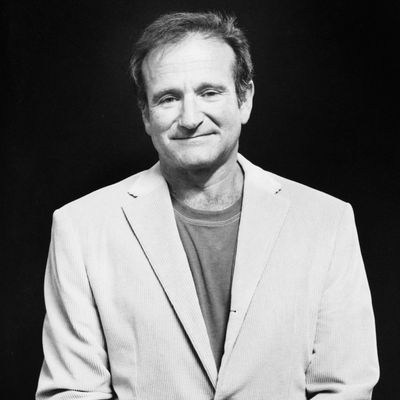
What hurts most about the apparent suicide of Robin Williams is that as much as he achieved, he died in his own mind unfulfilled. And to an extent, he was unfulfilled — he never found a form that would capture the genius of his stand-up act or his early appearances on The Tonight Show, when his mind worked faster than anyone alive and very possibly dead, when he seemed to be channeling a fleet of circling UFOs containing the galaxy’s best comedy writers. The man didn’t need to play a sitcom alien to seem as if he had his own extraterrestrial energy field.
No, it wasn’t all spontaneous. As with his kindred spirit Steve Martin, what seemed natural (or supernatural) had hours of practice and pain and self-doubt behind it. Whenever Robin Williams performed, he had to follow the toughest act in show business — Robin Williams. But if you saw him onstage — as I did, in San Francisco comedy clubs in the late ’80s whenever word got out to a select few (I wasn’t one, but I knew some) that he’d be slipping in late to try out new material — you could taste his joy in flying higher than any human had a right to. Flying high, of course, often meant flying high, and he was justly famous for saying that “Cocaine is God’s way of telling you you’re making too much money.” If there was a through line in his comedy, it was that having to invoke those spirits or UFOs or Gods of Comedy came with a cost, and that their departure left him naked and bereft.
Williams gave tremendous performances in a handful of movies, but it was Williams bottled and, in most cases, domesticated. It didn’t have that free-form, unfettered genius. That said, his nattering sailor in Robert Altman’s messy Popeye was musically dazzling. Even more musical was his performance in Paul Mazursky’s Moscow on the Hudson, in which the sadness of not being able to perform was right there in his eyes. Was he Russian in another life? The combination of mania and melancholy tapped something beautiful in him. In The Fisher King, Williams was also at the height of his powers. He knew how to play a man dangerously in touch with unseen forces, a holy fool, and for once he played opposite actors who were, each in their own way, worthy of him: Jeff Bridges, Mercedes Ruehl, and, most memorably, Amanda Plummer, who should have partnered with him again.
We do need to talk about those “domesticated” parts, because they were the ones that won him a huge mainstream audience and, in the case of his avuncular, bearded psychiatrist in Good Will Hunting, an Oscar. This was Williams the crinkle-eyed humanist. It began in Good Morning, Vietnam, in which his zany deejay gave soldiers (and civilians) in the middle of a tragic, hopeless, disgusting situation the gift of Hope and Laughter. In Dead Poets Society, he was the Good Father who tried to counter — via the Magic of Poetry — all the Bad Fathers of the ‘50s who thought that sitting in a forest declaiming verse was unmanly. He was — God help us all — the title character in Patch Adams, the clown doctor who made terminally ill kids laugh. (Could Jerry Lewis’s mercifully unseen concentration-camp scamp in The Day the Clown Cried be that much worse?) At least Mrs. Doubtfire — though a pale echo of Tootsie — had a few scenes in which the old rhythms could be felt, however faintly.
There was a darker side to Williams that he relished showing off, first as a foul-mouthed clerk (unbilled) in Dead Again, later as a taunting serial killer opposite Al Pacino in Insomnia. I wrote at the time: “The key is what [Williams] doesn’t do: Those rubber features remain rigid, that madcap energy harnessed. The sour little curl of Williams’ mouth reminds me of Laurence Olivier in The Entertainer — all the paranoid alertness of a stand-up comic with none of the genial pandering. There is nothing so despairing — or potentially so lethal — as a clown who has given up hope of making us laugh but wants to have an impact on us anyway.” On the other hand, Williams’s work as a creepy photo clerk who becomes obsessed with a family in One Hour Photo proved that Williams the self-effacing straight actor could be a dull man, indeed.
Flops — in film and television — were more common than hits in the last few years. The saddest thing is that Williams never found a collaborator who could give him the combination of structure and freedom in which he could thrive, much as Adam McKay lets Will Ferrell happily improvise for hours to find the magic in films like Talladega Nights and Step Brothers. I think Williams would have risen to the occasion. I think he was champing at the bit for it.
But you know what? You could put together a highlight reel of Williams’s work — the talk-show appearances interspersed with his stand-up interspersed with scenes from Popeye, The Survivors, The Best of Times, Seize the Day, Moscow on the Hudson, Cadillac Man, The Fisher King, Insomnia, The Birdcage, his appearance in Homicide: Life on the Street, and even Good Will Hunting (and a bit of his voice in Aladdin, of course) and see that the measure of the man was vast. Even when his talent was cruelly constricted, his soul was limitless.


